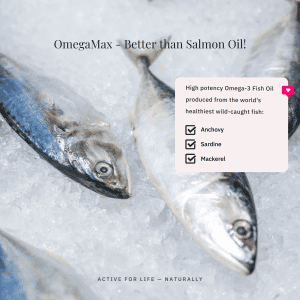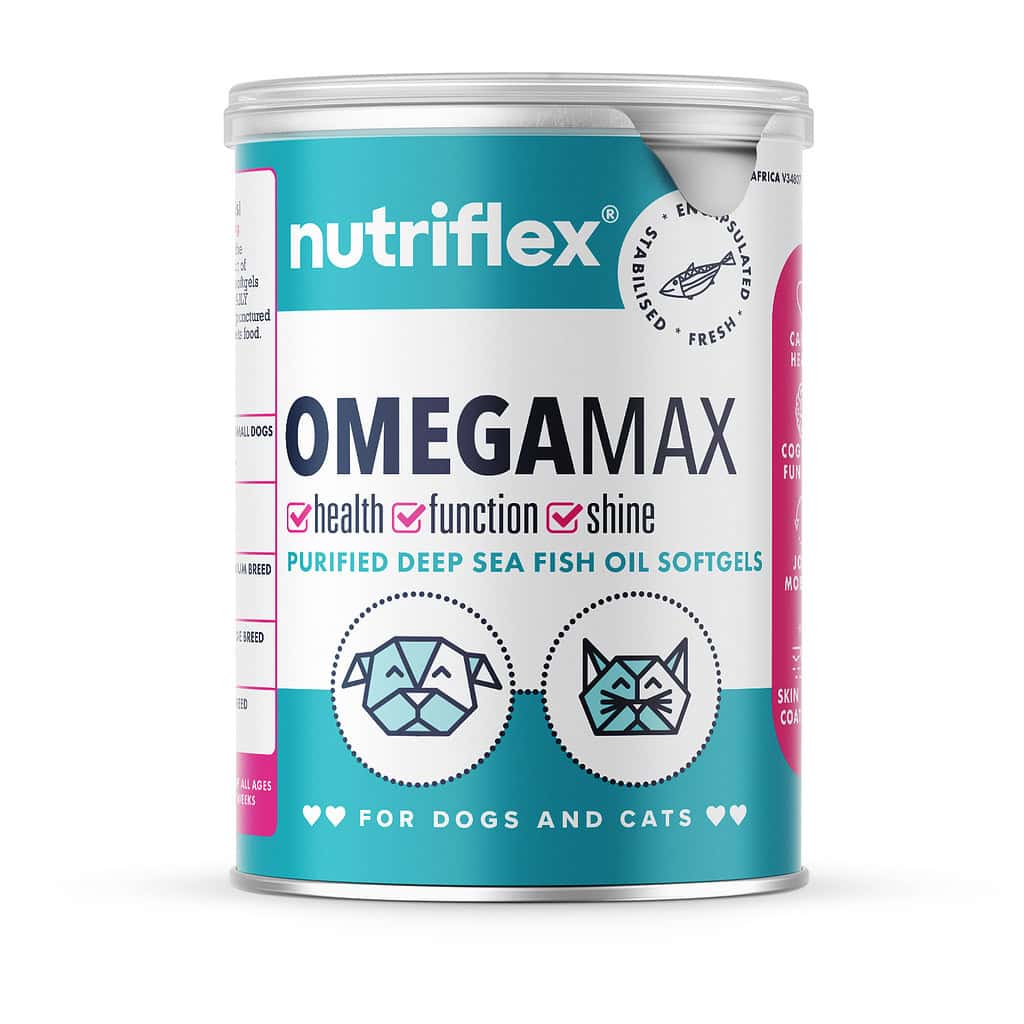The Known Benefits of Giving Your Dog Fish Oil
Fish oil is more than just a popular dietary supplement for humans; it also holds many health and wellness benefits for our canine companions. Extracted from the tissues of oily fish such as salmon, anchovy and mackerel, fish oil is packed with omega-3 fatty acids, specifically eicosapentaenoic acid (EPA) and docosahexaenoic acid (DHA). These essential fatty acids contribute to both dogs and cats well-being in several ways.
Let’s Dive Into The Key Benefits Of omega-3 For Dogs And Cats:
1. Improved Skin and Coat Health: One of the most noticeable benefits of fish oil is the potential improvement in a dog’s skin and coat health. Omega-3 fatty acids help to nourish your dog’s skin, reduce flaking, and promote a smooth, shiny coat. Furthermore, these fatty acids can alleviate symptoms associated with skin allergies or your pet’s skin disease and reduce excessive shedding.
2. Anti-Inflammatory Effects: Omega-3 fatty acids are renowned for their anti-inflammatory properties. They can help reduce inflammation associated with arthritis, allergies, and autoimmune diseases. This makes fish oil particularly beneficial for senior dogs or dogs with joint issues, potentially leading to improved mobility and reduced discomfort.
3. Cardiovascular Health: The EPA and DHA in fish oil contribute to a healthy heart and reduce the risk of cardiovascular disease by lowering triglycerides and blood pressure, slowing plaque development in the arteries, and reducing the likelihood of heart arrhythmia. All these benefits lead to a healthier cardiovascular system.
4. Enhance Cognitive Function: Omega-3 is essential for developing and maintaining the brain. DHA, in particular, plays a crucial role in the structure and function of brain cells. Therefore, providing fish oil can help support brain function in puppies during their developmental stage and also help slow cognitive decline in older dogs and cats.
5. Eye Development and Health: DHA is fundamental to developing and maintaining the eyes. Fish oil supplementation can thus be particularly beneficial for puppies’ eye development and the eye health of adult dogs.
6. Boosted Immune Function: Fish oils may help boost your dog’s immune function and nervous system development by promoting anti-inflammatory responses. Omega-3 can modulate the immune response, helping your dog’s body to defend itself against pathogens effectively.
7. Supports Kidney Health: Fish oils have shown benefits for dogs and cats with chronic kidney disease. Omega-3 can help reduce inflammation and support kidney function, potentially slowing disease progression.
Identifying the Need for Omega-3 Fish Oil Supplementation in Dogs
Omega-3 fish oils can provide numerous wellness benefits for dogs and cats, but how can you tell if your pet might benefit from a good fish oil? Certain signs and symptoms can indicate that your pet might need additional omega-3 in their diet. Here are some key indications to look out for:
Dry, Itchy Skin, Dull or Poor Coat:
One of the most visible signs your dog may need an omega-3 supplement is a dull coat or dry skin, itchy skin, flaky skin or hot spots. Omega-3 fatty acids are known for their ability to improve skin and coat health, and a lack of these vital nutrients can result in a lacklustre coat and skin issues.
Excessive Shedding:
While it’s normal for dogs to shed, excessive shedding can sometimes signal a deficiency in essential fatty acids, which play a vital role in maintaining healthy skin and fur.
Joint Pain or Stiffness:
Omega-3s are natural anti-inflammatories. If your dog exhibits signs of joint pain or stiffness or has been diagnosed with arthritis, an omega-3 supplement could help decrease inflammation and ease these symptoms.
Poor Immune Health:
If your dog appears to get sick often, has recurring infections or delayed wound healing, it could be signalling that their immune system needs support. Omega-3 fatty acids are renowned for their active role in boosting immune health.
Cognitive and Behavioral Issues:
Omega-3s play a crucial role in brain health. If your dog has been exhibiting changes in behaviour or cognitive function, particularly if they’re older, omega-3 supplementation might be beneficial.
Eye Disorders:
Omega-3 plays a crucial role in maintaining eye health. If your dog has been diagnosed with an eye disorder, consult your vet about the potential benefits of adding omega-3 to your dog’s diet.
What Are Fatty Acids Found in Fish Oils?
Fish oil is rich in a particular group of polyunsaturated fats known as omega-3 fatty acids. There are several omega-3 fatty acids, but the two most important and beneficial ones found in fish oil are eicosapentaenoic (EPA) and docosahexaenoic (DHA) acids.
Eicosapentaenoic Acid (EPA)
EPA is a 20-carbon omega-3 fatty acid. It plays a crucial role in producing eicosanoids, signalling molecules that participate in the body’s inflammatory and immune responses. EPA is known for its potent anti-inflammatory properties and is primarily used by the body to reduce inflammation, support heart health, immune function, and joint health and manage inflammatory bowel disease.
Docosahexaenoic Acid (DHA)
DHA is a 22-carbon omega-3 fatty acid. It’s a primary structural component of the brain, skin, retina, and testicles. DHA fatty acids help facilitate nerve signal transmission in the brain and support brain health and function. In the retina, DHA is crucial for normal vision.
Balance Omega-6 and Omega-3
Omega-6 and omega-3 are both types of polyunsaturated fats that play critical roles in your dog’s body. Both are involved in various physiological processes, from supporting cell membrane integrity to playing pivotal roles in inflammation, immune response, and overall health.
While both are essential, what’s crucial for your dog’s health is the ratio of omega-6 to omega-3 in their diet. Unfortunately, today’s common dog foods are disproportionately high in omega-6, primarily due to the prevalent use of plant-based oils like corn, soybean, and sunflower oil in processed foods. While omega-6 is necessary for certain bodily functions, an excess can contribute to inflammation and other health issues.
Conversely, omega-3 fatty acids, notably EPA and DHA, found in fish oils, possess potent anti-inflammatory properties. These beneficial effects help counterbalance the effects of omega-6 and maintain a healthier omega-6 to omega-3 ratio. For dogs, a ratio of around 5:1 to 10:1 (omega-6: omega-3) is often recommended, though this can vary depending on specific health concerns and the individual dog.
Integrating a high-quality fish oil supplement into your dog’s diet can be an effective way to adjust this ratio, given the high content of omega-3 fatty acids in fish oil. However, it’s important to remember that balance is key. Omega-6 and omega-3 have vital roles, and neither should be neglected or excessively consumed.
What’s The Best Fish Oil For Dogs?
Determining the “best” fish oil supplement for dogs and cats depends on various factors, including the dog’s size, age, breed, diet, health status, and specific health needs. It also depends on the supplement’s quality, sourcing, and concentration of omega-3 fatty acids. That being said, here are five key attributes to look for when choosing a high-quality supplement for your dog:
1. High in EPA and DHA: Look for fish oil for dogs with high concentrations of the omega-3 fatty acids eicosapentaenoic (EPA) and docosahexaenoic (DHA). These two fatty acids have been studied extensively for their health benefits, and supplements that contain significant amounts of EPA and DHA will typically be more beneficial for your dog.
2. Purity and Quality: The supplement should be free from contaminants such as heavy metals, PCBs, and dioxins. Look for products that have undergone third-party testing or have a certificate of analysis to verify their purity and potency.
3. Sourcing: Opt for fish oil derived from wild-caught fish over farmed fish, as it usually contains higher levels of omega-3s and is less likely to be contaminated. It’s also preferable if the fish is sourced from clean, sustainable fisheries.
4. Packaging: Fish oil can oxidise and turn rancid when exposed to air, heat and light. Therefore, look for supplements that come in a dark bottle or are otherwise packaged to protect against these elements.
5. Form of Supplement: Fish oil supplements for dogs and cats come in various forms, including liquid, capsules, and chewable tablets. Consider your pet’s preferences and what will be easiest for you to administer.
For example, based on these criteria, a product like the OmegaMax Purified Deep Sea Fish Oil Softgels 1000mg is an excellent choice. These softgel fish oil for dogs contain a significant amount of EPA and DHA, are sourced from deep-sea fish, and come in an easy-to-administer softgel form.
The Superiority of Omega-3 Fish Oil Sourced from Wild-Caught Anchovy, Sardines, and Mackerel
Fish oils can be derived from various species of fish. However, the quality and composition of the omega-3 fatty acids in the fish oil can significantly depend on the type of fish used. Here’s why OmegaMax Omega-3 softgels, which source their fish oil from wild-caught, sustainably fished anchovy, sardines, and mackerel, can be considered superior to fish oils sourced from salmon.
Higher Omega-3 Content:
Anchovies, sardines, and mackerel tend to have a higher concentration of omega-3 fatty acids, specifically EPA and DHA, compared to many types of salmon, especially farmed salmon. Therefore, fish oils from these species often deliver a higher dose of these beneficial fatty acids.
Lower Contaminant Levels:
Anchovies and sardines are small, short-lived fish that feed on plankton, which means they accumulate fewer contaminants and toxins, like mercury and PCBs, over their lifetimes compared to larger, longer-lived species like salmon. This makes fish oil sourced from these small fish generally purer and safer than salmon oil.
Sustainable Sourcing:
Anchovies, sardines, and mackerel are often more sustainable sources of fish oil. These species reproduce quickly and in large numbers, making them less susceptible to overfishing. In contrast, certain types of wild salmon are overfished, and their populations are declining.
Lower Impact on Ecosystem:
Harvesting small, plentiful fish like anchovies, sardines, and mackerel for fish oil has a lower impact on the marine ecosystem than harvesting larger predatory fish like salmon. So by sourcing fish oil from these smaller fish, OmegaMax is helping to maintain a healthier, more balanced marine ecosystem.
Consistency:
Farmed salmon’s diet can vary significantly, leading to variations in the omega-3 content of the fish oil derived from them. In contrast, the diet of wild-caught anchovy, sardines, and mackerel is more consistent, leading to a more reliable omega-3 content.
In conclusion, while salmon oil can still provide beneficial omega-3, the fish oil in NutriFlex OmegaMax Omega-3 Softgels, sourced from wild-caught, sustainably fished anchovy, sardines, and mackerel, offers a superior, purer, and more sustainable choice for your dogs’ health.
How much fish oil should I give my dog?
Determining the correct dosage of fish oil for your dog depends on several factors, including your dog’s size, age, diet, overall health, and specific health concerns.
For healthy dogs, a standard recommendation is to give around 44-121mg combined EPA and DHA per kilogram of body weight daily. This dosage can provide the general health benefits associated with omega-3. Here’s how this might look for dogs of different sizes:
- Small Breed Dogs (up to 10kg): 440-12100mg of combined EPA and DHA
- Medium Dogs (11-20kg): 880-2420mg of combined EPA and DHA
- Large Dogs (21-45kg): 1760-5445mg of combined EPA and DHA
- Very Large Dogs (45+kg): 4950-6000mg of combined EPA and DHA
For dogs battling specific health issues, such as skin conditions, skin disease, arthritis, kidney disease, or heart disease, a veterinarian might recommend a higher dosage. However, giving fish oil supplements to fur babies at high doses should always be administered under the guidance of a veterinarian due to the potential for adverse reactions.
The Crucial Role of Vitamin E in Fish Oil Supplements
Vitamin E is a crucial ingredient added to fish oil supplements like OmegaMax Omega 3 for a couple of key reasons: to preserve the oil’s freshness, eliminate fishy odour and balance the effects of omega-3 in the body.
1. Preservation of Fish Oil:
Fish oil is susceptible to oxidation, a process where the oil reacts with oxygen in the air and breaks down, potentially forming harmful substances. Oxidation can degrade the quality of the oil, reduce its nutritional value, and lead to a rancid smell or taste. Vitamin E, a potent antioxidant, can prevent this oxidation process. It neutralises free radicals, unstable atoms that can cause oxidation. Stabilising these free radicals helps maintain the freshness and nutritional value of the fish oil.
2. Balance in the Body:
Omega-3, while beneficial, can also deplete the body’s level of vitamin E. This is because, as a fat-soluble vitamin, it’s used up when it prevents the oxidation of fats and oils, including omega-3 fatty acids. Supplementing with additional vitamin E can help to balance this effect, ensuring that the body has enough to perform its many functions, which include boosting the immune system, widening blood vessels, preventing clotting, and contributing to skin health.
Introducing NutriFlex OmegaMax: The Gold Standard in Omega-3 for Dogs and Cats
Quality is non-negotiable for pet owners seeking the best for their four-legged companions. Enter NutriFlex OmegaMax – the premier choice for Omega-3 supplementation in dogs. OmegaMax doesn’t just meet the standards for canine health; it sets them.
NutriFlex OmegaMax fish oil for dogs is sourced from wild-caught, sustainably fished anchovies, sardines, and mackerel. This choice of source provides an eco-conscious solution without compromising on quality. These fish are naturally high in Omega-3 fatty acids and have a shorter lifespan, significantly reducing the risk of heavy metal accumulation and offering a safer product for your pet.
But what truly sets OmegaMax apart is the meticulous care taken in the extraction and encapsulation process. Each 1000mg OmegaMax softgel capsule is packed with 180mg EPA and 120mg DHA, providing a potent dose of the essential Omega-3 fatty acids that dogs need for optimal health. Including a natural antioxidant ensures the freshness of the fish oil and adds to the overall health benefits.
OmegaMax omega-3 for dogs and cats is more than just a fish oil supplement. It’s a commitment to quality, a testament to the belief that our dogs deserve only the best. From supporting healthy skin and a glossy coat to promoting joint and cardiovascular general health, OmegaMax fish oil for dogs and cats has you covered. It’s the Omega-3 supplement you can trust, designed to deliver the nutrients your pet needs in the safest, most efficient way possible.
Make the switch to NutriFlex OmegaMax today and experience the difference a truly superior Omega-3 supplement can make in your pet’s health and well-being. Your canine companion deserves nothing less.



